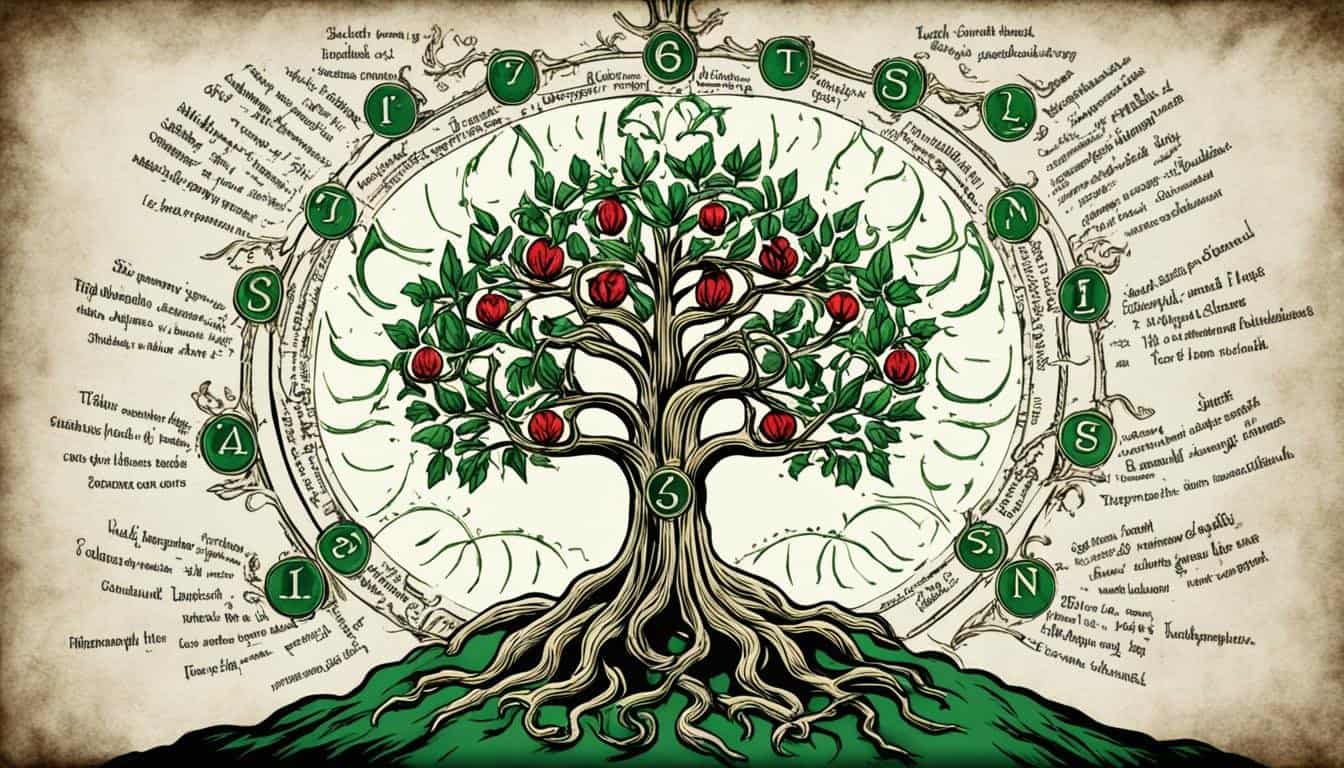Have you ever thought about if the Seven Deadly Sins are really in the Bible? Or are they just ideas made by theologians over time? This question makes us think about sin and its role in scripture. The Seven Deadly Sins guide us away from actions that could harm our spiritual health. They are often talked about in church and discussions, but knowing where they come from in the Bible is key to understanding their deeper meaning.
The Seven Deadly Sins come from early Christian teachings. But we need to look into the Bible to see how they fit. We will look into what these sins mean, how they affect us, and what Bible verses might talk about them. Join us as we explore these important ideas that have shaped faith and morality for centuries. For more information, check out this link.
Key Takeaways
- The Seven Deadly Sins are key ideas in Christian teachings.
- They act as a moral guide for our spiritual paths.
- Knowing their roots in the Bible helps us understand scripture better.
- Early teachings of the church helped shape these concepts.
- This journey encourages us to think about our actions and choices.
Understanding the Concept of Sin
Sin has many meanings across cultures and religions. In Christianity, it means doing something that breaks God’s laws. This idea helps us know right from wrong.
On our spiritual path, we try to understand different kinds of sin. Serious sins, or mortal sins, are big mistakes against God. Less serious sins, or venial sins, also matter but not as much.
The Seven Deadly Sins help us see our flaws. By looking at sin, we learn how to live spiritually. It shapes our moral choices and helps us connect with others and ourselves.
| Type of Sin | Description | Impact on Relationship with God |
|---|---|---|
| Mortal Sin | A grave violation of God’s law | Severely damages our relationship with God |
| Venial Sin | A lesser offense that doesn’t break our relationship with God | Affects our spiritual growth |
The Seven Deadly Sins Explained
Exploring the Seven Deadly Sins gives us deep insights into human nature and how we interact with each other. Pride and envy are two sins that have big effects on our moral values and how we connect with others. Let’s dive into these sins to see how they impact our lives.
Pride: A Dangerous Trap
Pride is a sneaky sin among the Seven Deadly Sins. It shows up as thinking too highly of ourselves, ignoring humility and respect for others. This can make us ignore what’s right and think we’re better than we are. As the Bible says in Proverbs 16:18, “pride goeth before destruction,” warning us of the bad outcomes of putting ourselves above others.
Envy: The Poison of the Heart
Envy is a harmful emotion, filled with jealousy towards others’ success or things they have. This feeling can turn into bitterness, damaging our relationships and making us feel morally low. According to Galatians 5:26, envy poisons our hearts, causing division and cutting us off from the support and happiness that being with others should bring.

Scriptural References to the Seven Deadly Sins
Understanding the biblical context of pride and wrath helps us see their impact on our lives. These emotions can change our character and lead us away from spiritual health. Let’s look at verses that show the dangers of pride and wrath.
Pride and Its Consequences
Pride often leads to other sins, causing us to be unhappy and rebel against God. Proverbs 16:18 warns us, “Pride goeth before destruction, and a haughty spirit before a fall.” This verse tells us the serious harm pride can cause, making us more open to danger.
It shows how pride can make conflicts worse and cause deep problems in our personal and community lives.
Wrath in Biblical Context
Wrath is also seen as a sin in the Bible. Proverbs 15:1 says, “A soft answer turneth away wrath; but grievous words stir up anger.” This verse teaches us how to handle our feelings and the harm of unchecked anger.
It tells us to seek peace and warns that losing control can lead to spiritual problems. This can make us distant from God and others.
The Seven Deadly Sins: Are They in the Bible?
Many wonder if the Seven Deadly Sins are in the Bible. A closer look shows us the truth. These sins aren’t listed directly, but their ideas are found throughout the Bible. The theological origins of this idea come from early church teachings. Figures like Pope Gregory I created this list, blending biblical references to the Seven Deadly Sins with church traditions.

The classic teachings on the Seven Deadly Sins shape how we see right and wrong. Each sin shows us our personal flaws and the big themes of temptation and spiritual commitment. By looking into the Bible, we see how these sins affect us every day.
For those looking for forgiveness, the Bible offers guidance. Forgiveness is key in many biblical teachings. It helps us deal with these challenges.
The theological origins of the Seven Deadly Sins add depth to their meaning. Early thinkers shared these ideas to help the church understand right and wrong. Even though they’re not directly in the Bible, their ideas are part of Christian teaching. They push us to think about our actions and what we intend to do.
Exploring Each Sin Individually
We’re going to look into sloth, greed, lust, and gluttony. These sins warn us about our weaknesses and neglecting our spiritual health. Let’s see what each sin means.
Sloth: The Sin of Laziness
Sloth means not wanting to do our duties and make an effort. It can cause us to miss chances and not reach our full potential. Proverbs 18:9 says laziness is like wasting things. By understanding sloth, we can start to live more fully and productively.
Greed: The Lust for More
Greed is wanting more and more stuff. It makes people chase wealth too hard, hurting relationships and morals. Luke 12:15 tells us chasing wealth is pointless. Switching to a balanced life can help us be thankful instead of greedy, making us happier spiritually and emotionally.
Lust: The Desire of the Flesh
Lust is a strong want for physical pleasure. It can cloud our spiritual focus and moral values. 1 John 2:16 reminds us these desires are short-lived. By facing lust, we can look for deeper connections than just physical ones.
Gluttony: Excessive Consumption
Gluttony is taking too much of anything, not just food. Proverbs 23:20-21 warns us about its dangers, leading to health problems and emptiness inside. By being moderate, we can enjoy life more and be happier with less.

Looking into these sins helps us see how they affect us. From sloth to gluttony, they remind us to aim for balance and virtue. For more on these topics, check out resources on spiritual truths.
The Dangers of the Seven Deadly Sins
The Seven Deadly Sins are more than just personal flaws. They threaten our moral values and spiritual health. Each sin can destroy our relationships and harm our integrity. If we let these traits dominate, we may lose our connection with God and our cherished values.
These sins can deeply affect our lives, leading to serious issues. For example, greed makes us crave wealth more than kindness. Envy can break bonds with friends and family. We must see how these sins can lead to a spiritual downfall, leaving us empty inside.
Learning about the Seven Deadly Sins shows us why we should aim for virtue. We can fight these negative forces by promoting virtues like humility and kindness. This way, we live a more ethical and fulfilling life.

| Sin | Impact on Relationships | Ethical Consequences | Spiritual Downfall |
|---|---|---|---|
| Pride | Leads to isolation | Encourages dishonesty | Alienates from God |
| Envy | Causes resentment | Destroys trust | Fosters bitterness |
| Greed | Results in exploitation | Undermines generosity | Creates emptiness |
| Lust | Harms emotional bonds | Disregards commitment | Weakens spiritual health |
| Gluttony | Neglects relationships | Encourages self-indulgence | Consumes spiritual growth |
| Sloth | Fosters neglect | Avoids responsibility | Stalls spiritual progress |
| Wrath | Destroys alliances | Promotes violence | Leads to despair |
By understanding the dangers of the Seven Deadly Sins, we can live a better life. Knowing about these sins helps us make choices that support ethical living and spiritual growth. For more information on overcoming these challenges, visit this resource.
Overcoming the Seven Deadly Sins
In our journey toward spiritual growth, we often face challenges that can lead us away from our path. Overcoming sin is key to our efforts, needing a deep understanding of humility and contentment. By recognizing our limits, we can fight the temptation of the Seven Deadly Sins better.
The Blessing of Humility
Humility is crucial in our fight for holiness. Having a humble mindset lets us open our hearts to grace and see our need for divine guidance. The scripture reminds us, “God resisteth the proud, but giveth grace unto the humble.” This shows us that humility protects us from sin and helps us grow spiritually.
When we’re honest about our weaknesses, we get better at facing our flaws and beating sin.
Reward of Contentment
Contentment changes how we see life. Philippians 4:11 teaches us to value our lives, no matter what others have. This helps us find peace and focus on growing personally, not envying others.
Being thankful helps us create a space where beating sin is possible. Contentment lets us release desires that only bring us down and lead to sin.
| Quality | Benefit |
|---|---|
| Humility | Opens us to divine grace |
| Contentment | Encourages appreciation of what we have |
| Spiritual Growth | Strengthens our resilience against sin |
By choosing humility and contentment, we start a journey to beat the Seven Deadly Sins. These qualities make our lives richer and protect us from temptations, helping us grow spiritually deeply.
The Spiritual Impact of Embracing Virtue
Embracing virtue is a key way to grow spiritually. Focusing on positive traits like love, joy, and peace helps us connect better with faith and others. These virtues fight against the Seven Deadly Sins, helping us live with purpose and integrity.
When we practice embracing virtue, we swap bad habits for good ones. This change improves our character and helps us resist temptations. It’s a rewarding journey that changes how we see things and act, letting us live by our values.
| Virtue | Effect on Spiritual Growth | Role in Positive Mindset |
|---|---|---|
| Love | Deepens connections with others | Fosters empathy and understanding |
| Joy | Encourages gratitude and appreciation | Increases overall happiness |
| Peace | Promotes inner calm and steadiness | Reduces stress and anxiety |
| Patience | Enhances resilience in challenges | Supports hopeful outlook |
| Kindness | Builds supportive communities | Encourages a generous spirit |
By choosing these virtues, we support our spiritual path. Every effort to cultivate these traits helps us grow, making us embrace virtue more fully. By focusing on these qualities, we create a space for personal growth and deeper spiritual connections. Learn more about how character affects our growth from this insightful resource.
Are Any of the Seven Deadly Sins Linked to the Biblical Consequences of Adultery?
Adultery is strongly condemned in scripture, with consequences that bear striking similarities to several of the seven deadly sins, including lust and envy. The biblical teachings on adultery and consequences emphasize the spiritual, emotional, and societal harm that arises, reinforcing the serious moral ramifications tied to such actions.
Calling to Avoid Sin and Temptation
In our faith journey, we often face the call to avoid sin and resist temptation. 1 Corinthians 10:13 reminds us we’re not alone in these challenges. God is always there, giving us strength to overcome and resist temptation. This promise helps us stay true to our faith.
Our communities offer great support in fighting against sin. Being with others, through prayer, study, or just talking, helps us stay strong. Scripture teaches us how to avoid sin and live righteously.
We aim for a life of spiritual integrity, leading to fulfillment beyond earthly desires. The promise of the “crown of life” in Revelation 2:10 motivates us. It reminds us of the rewards for living in harmony with God’s will. Let’s work together to live by these values and resist temptation.
Affiliate Disclosure: "As an Amazon Associate I earn from qualifying purchases made from links in this post. We are a participant in the Amazon Services LLC Associates Program, an affiliate advertising program designed to provide a means for us to earn fees by linking to Amazon.com."

